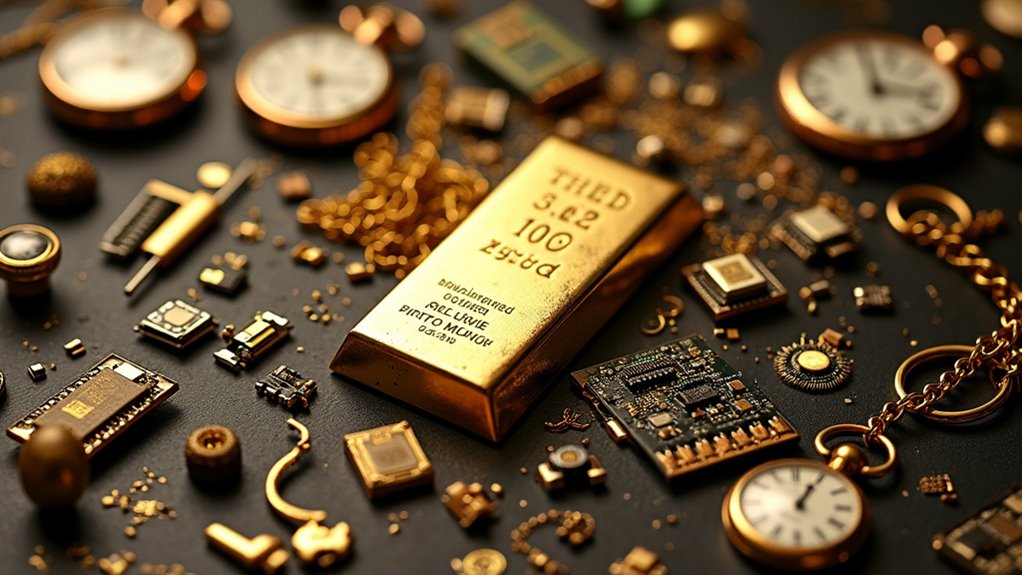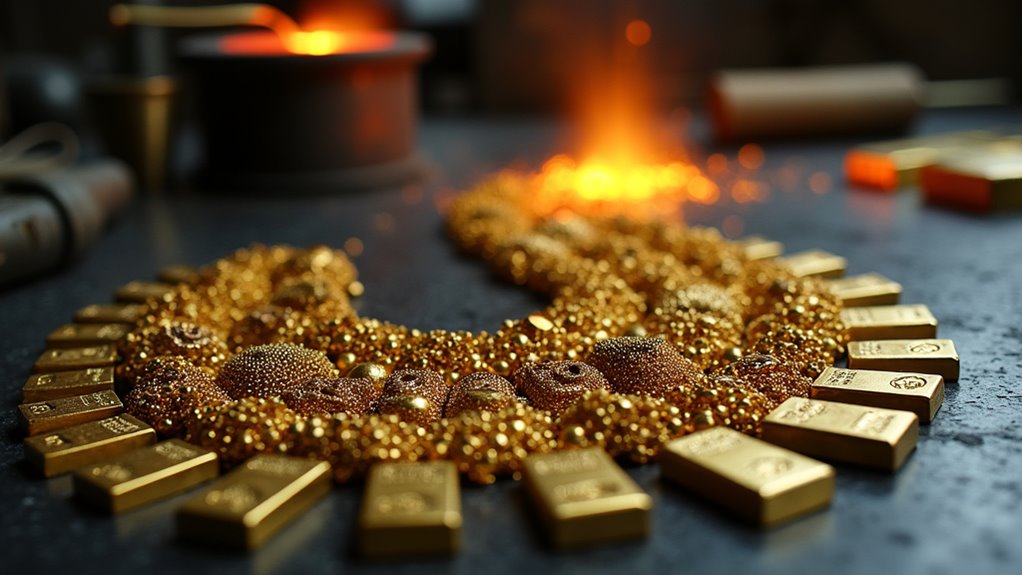Recycled rose gold rings can be found through multiple ethical channels in Australia. Local artisanal jewellers specialise in crafting bespoke pieces using sustainably sourced materials, while established boutiques offer curated collections with transparent supply chains. Online marketplaces connect buyers with independent craftspeople, though verification of recycling claims is essential. Eco-conscious consumers should prioritise retailers who provide documentation of their recycling practices and material origins. The journey toward sustainable luxury jewellery reveals fascinating options for the discerning buyer.

Countless eco-conscious couples are turning to recycled rose gold rings as a sustainable alternative in the fine jewellery market. As awareness grows about the environmental and ethical impacts of traditional gold mining, consumers are increasingly seeking out pieces that align with their values whilst maintaining the beauty and durability of conventional precious metals. Additionally, choosing recycled gold jewellery supports the value of recycled gold in ethical fashion, promoting eco-conscious consumer choices. The demand for sustainable gold is driving changing market dynamics, encouraging more brands to adopt greener practices. Furthermore, the use of recycled gold in jewellery production helps to minimize the environmental footprint associated with new gold mining.
Finding the perfect recycled rose gold ring involves exploring various specialised venues and artisanal craftspeople. Local jewellers who prioritise sustainable practices often maintain intimate workshops where they create bespoke pieces using recycled materials. These skilled artisans frequently offer personalised consultations, allowing customers to participate in the design process whilst guaranteeing their chosen piece meets both aesthetic and ethical requirements. Furthermore, these artisans often adhere to fair trade standards, ensuring that their sourcing methods are both ethical and responsible.
Artisanal jewellers craft unique recycled rose gold rings in intimate workshops, offering personalised design experiences that blend sustainability with artistic vision.
Sustainable jewellery brands have emerged as reliable sources for recycled rose gold rings, with many maintaining robust online presences. These companies typically emphasise transparency in their supply chains and manufacturing processes, providing detailed information about their recycling practices and environmental commitments. Many showcase their collections through detailed catalogues that highlight the unique characteristics of each piece, including the specific karat weight and design elements.
Bridal boutiques specialising in ethical jewellery have begun incorporating recycled rose gold options into their collections. These establishments often employ knowledgeable staff who can explain the benefits of choosing recycled materials, while guiding couples through the selection process. Some boutiques even organise private viewing sessions, creating an intimate atmosphere for such significant purchases.
Online marketplaces dedicated to sustainable fashion have become valuable resources for discovering recycled rose gold rings. These platforms frequently connect consumers directly with independent jewellers and small-scale producers, offering a diverse range of styles and price points. However, buyers should exercise due diligence when verifying recycling claims, as some sellers may engage in greenwashing practises.
Despite the growing availability of recycled rose gold rings, consumers should be aware of certain challenges in the market. The lack of standardised labelling for recycled gold can make it difficult to verify the true origins of materials. Additionally, some pieces marketed as recycled may contain a mixture of new and reused gold, potentially compromising their sustainability credentials.
Supporting local artisans and ethical jewellery makers not only guarantees access to unique, handcrafted pieces but also contributes to the sustainability of small businesses. These craftspeople often maintain strong relationships with reliable recycled metal suppliers and can provide detailed information about their sourcing practices. Their dedication to traditional techniques and attention to detail results in rings that are both environmentally conscious and exquisitely crafted, making them ideal choices for those seeking meaningful, sustainable jewellery options.
Frequently Asked Questions
How Long Does Rose Gold Plating Typically Last on Recycled Rings?
Rose gold plating typically lasts between 6 months to 2 years on recycled rings, depending on several essential factors.
The longevity varies based on the plating thickness (ideally 2.5+ microns), quality of the base metal, and wearing habits.
Daily wear considerably reduces lifespan, while occasional use can extend it.
Regular maintenance, including proper storage and avoiding harsh chemicals, helps preserve the plating’s durability.
Can Recycled Rose Gold Rings Be Resized Like Traditional Gold Rings?
Recycled rose gold rings can indeed be resized similarly to traditional gold rings, though the process requires special care.
While both types maintain comparable physical properties, recycled rose gold may exhibit slight variations in malleability due to its alloy composition.
Professional jewellers can resize these rings using standard techniques, though costs typically range from $100-$150.
The process involves careful heating and manipulation to preserve the ring’s structural integrity and finish.
What’s the Price Difference Between Recycled and New Rose Gold Rings?
Recycled rose gold rings typically cost 30-40% less than their newly mined counterparts.
While recycled 14k rose gold rings generally range from $475 to $1,990, new 18k pieces can fetch between $1,500 to $3,000 for similar designs.
The price difference stems from reduced mining and manufacturing costs associated with recycled gold.
However, both maintain identical quality, as gold’s chemical properties remain unchanged regardless of its source.
Are Recycled Rose Gold Rings Hypoallergenic?
Recycled rose gold rings aren’t inherently hypoallergenic, as they contain the same alloy metals as new rose gold.
The copper content, which gives rose gold its distinctive colour, can trigger allergic reactions in sensitive individuals.
While the recycled nature doesn’t affect its hypoallergenic properties, buyers with sensitivities should consider higher karat options (18k) or custom alloys using palladium instead of copper.
Consulting with jewellers about specific alloy compositions is recommended.
How Can I Verify if a Rose Gold Ring Is Genuinely Recycled?
To verify a genuine recycled rose gold ring, buyers should examine certifications from recognised organisations like SCS Global Services or the Responsible Jewellery Council.
Request documentation that confirms the gold’s recycled origins and review the jeweller’s sustainability statements.
Look for explicit mentions of recycled materials in product descriptions and check if the company partners with ethical sourcing programs.
Quality testing results and transparency reports can provide additional confirmation of recycled authenticity.













